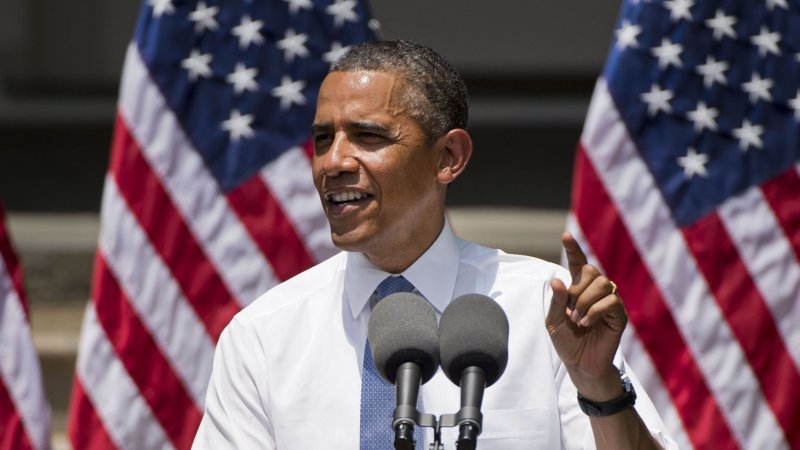President Barack Obama delivers remarks on the campus of Georgetown University on June 25, 2013 in Washington, D.C. UPI/Kevin Dietsch |
License Photo
WASHINGTON, June 25 (UPI) -- President Barack Obama criticized the U.S. Supreme Court decision striking down a key provision of the Voting Rights Act but the ruling drew praise elsewhere.
The provision, Section 4, identifies all or parts of 16 states, mainly in the South with a history of discrimination. A separate provision, Section 5, not struck down by the Supreme Court, forces those states to get permission -- or "preclearance" -- from the U.S. Justice Department or a three-judge federal panel in Washington to make any changes, no matter how innocuous, in how people vote in their jurisdictions. The ruling said conditions had changed and the restrictions were no longer fair.
But without the identifying the parts of the country affected, the "preclearance" requirement is meaningless.
South Carolina's attorney general praised the decision. South Carolina challenged the Voting Rights Act provisions when they were adopted in 1965.
"For nearly 50 years, Sections 4 and 5 have imposed an extraordinary intrusion into state sovereignty in certain states, including South Carolina," Attorney General Alan Wilson said, The Wall Street Journal reported. "This is a victory for all voters as all states can now act equally without some having to ask for permission or being required to jump through the extraordinary hoops demanded by federal bureaucracy."
The act had been challenged by Shelby County, Ala., but there was no immediate reaction to the ruling on the county's webpage.
In a statement from the White House, the president said: "I am deeply disappointed with the Supreme Court's decision today. For nearly 50 years, the Voting Rights Act -- enacted and repeatedly renewed by wide bipartisan majorities in Congress -- has helped secure the right to vote for millions of Americans. Today's decision invalidating one of its core provisions upsets decades of well-established practices that help make sure voting is fair, especially in places where voting discrimination has been historically prevalent."
U.S. Attorney General Eric Holder, calling the Voting Rights Act "a cornerstone of American civil rights law," said in Washington he was "deeply disappointed" with the ruling but noted the "constitutionally protected voting rights of all Americans remain fully intact. And the right to vote, free from discrimination based on race or language, requires our vigilant protection it ."
"This decision represents a serious setback for voting rights -- and has the potential to negatively affect millions of Americans across the country," Holder said.
"The Department of Justice will continue to carefully monitor jurisdictions around the country for voting changes that may hamper voting rights," he said. "Let me be very clear: we will not hesitate to take swift enforcement action -- using every legal tool that remains available to us -- against any jurisdiction that seeks to take advantage of the Supreme Court's ruling by hindering eligible citizens' full and free exercise of the franchise."
Holder echoed Obama's call for Congress "to act to make sure every American has equal access to the polls."
Nina Perales, vice president of litigation for the Mexican American Legal Defense Fund, said, "The court's decision ignores the reality of continuing discrimination, undermining the integrity of American elections."
MALDEF said in a statement the "preclearance" provision successfully blocked Texas in 2012 "from using discriminatory redistricting plans and blocked Texas from using a new, strict photo voter ID law that would have prevented a disproportionate number of Latinos from voting. In 2002, the 'preclearance' provision successfully blocked Arizona from using discriminatory redistricting plans to elect members of the state House of Representatives and Senate."
Wade Henderson, president of The Leadership Conference on Civil and Human Rights, said, "Today's decision is a setback to our democracy and the voting rights of real Americans."
Michael Waldman, president of the Brennan for Justice in New York, said Congress could remedy the situation.
"The Supreme Court's decision is at odds with recent history," he said. "The Voting Rights Act was vital in 2012, not just 1965. For nearly five decades, it has been the nation's most effective tool to eradicate racial discrimination in voting. And it is still critical today. Last year, Section 5 helped block laws making it harder to vote. There is a path forward. Section 5 stands. Congress now has the duty to upgrade this key protection and ensure our elections remain free, fair, and accessible for all Americans."
In the high court majority opinion, Chief Justice John Roberts said: "Congress may draft another formula based on current conditions. Such a formula is an initial prerequisite to a determination that exceptional conditions still exist justifying such an 'extraordinary departure from the traditional course of relations between the states and the federal government."
Justice Ruth Bader Ginsburg, joined by the court's three other liberals, dissented, saying the court's conservative members view the law's success as an argument for doing away with it.
"The sad irony of today's decision lies in [the majority's] utter failure to grasp why the VRA has proven effective," Ginsberg wrote. "Throwing out preclearance when it has worked and is continuing to work to stop discriminatory changes is like throwing away your umbrella in a rainstorm because you are not getting wet."















